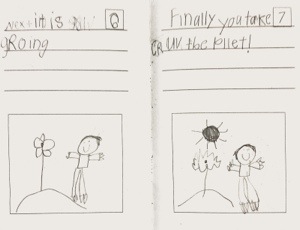When we were all lucky enough to have a full two weeks back at our placements, I realized exactly how hard it’s going to be to be a blogging teacher. It isn’t really a matter of time–when something means something to you, you make time for it. What’s really tough is having the BRAIN POWER it takes to reflect deeply and in meaningful ways because by the time I get home after a fully mentally, emotionally, intellectually involved day, I most want to get home to a big glass of OJ, not necessarily more mentally, emotionally, intellectually involved work. But I did it. I blogged through the pain, forced my brain power to its limits and I can honestly say, I am feeling more and more like a reflective teacher who blogs.
Over the course of the quarter, I’ve made more of an effort to do the things I talked about in my first blog of the quarter, “New Year, New Blogs.” I’ve been trying to approach our cohort’s blogging endeavor as something social, instead of solitary beings behind computer screens writing words that may or may not be read by others. Instead, I attempted to pay more attention to what my peers were saying and if I could, push back on their ideas, ask them questions to elaborate, or even just share what I thought about the same topic. I’ve tried to learn more about teaching from my peers and their practices and experiences while also contributing to their learning, like when I asked one blogger a question in order to better understand why he thought something happened in his classroom. He responded with a careful, clearly thought-out response that helped me think about my future classroom, and how I would want to support my students’ in reviewing prior knowledge and not assuming they know what I think they should already know.
Most importantly this quarter, I have grown as a teacher who reflects on what her students have learned. Although I’m certainly no where near the ability of an experienced teacher (like my CT) in analyzing students’ work and assessing it accurately and for further instruction, I’ve been careful to think about my focus students, their contexts, and the growth I have seen in them since the first day of school. Here is my very favorite piece of evidence from one of my focus students:

Here’s a sample of his writing from November, which says, “I like going to Costco and getting a basketball hoop.” The picture is a clearer representation of his “story,” while he is still in the stage of an emergent writing, figuring out consonant sounds to show his words. The clearest word, “like,” is so clear because it was a sight word and he’d had lots of experience seeing and using it.
The next piece of evidence is his writing from this month in his very first “How to” book, which the students have recently started working on in Writer’s Workshop. His “How to Plant a Seed” guide shows measurable growth. He’s using vowels! He’s using word chunks like “ake” in “take” and “ing” in “growing”!! He’s very clearly using the sounds he hears in words to figure out which letters to use!!!

Blogging isn’t hard work, but it is an act that requires reflection and full participation. Although the end of the quarter has come and I will no longer be required to blog, I’m excited to take this on fully as an educator, and not as a student doing it for a grade.